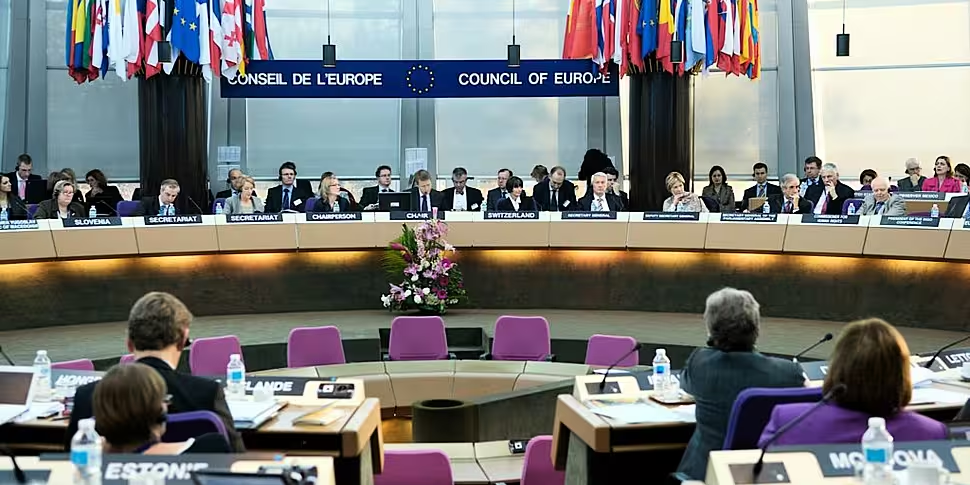Several legacy issues relating to Northern Ireland have been raised at the Council of Europe.
The Council of Europe Committee of Ministers in Strasbourg is examining a number of cases related to dealing with the legacy of the Troubles - including the case of Pat Finucane.
Mr Finucane represented IRA hunger strikers and was killed in front of his family by Ulster Defence Association (UDA) gunmen at his home in February 1989.
The Finucane family had claimed that former British Prime Minister David Cameron reneged on a commitment, given to their family, for a public inquiry into the circumstances of his murder.
Tánaiste Simon Coveney said the Government delivered a statement to the Committee of Ministers earlier.
It said Ireland "continues to support" the re-opening of individual measures in the Finucane case.
The Taoiseach Leo Varadkar has previously said there should be an independent public inquiry into the murder of the Belfast solicitor.
Mr Finucane's family lost a UK Supreme Court challenge last month over the decision not to hold a public inquiry into his murder.
However, they won a declaration that an effective investigation into his death was not carried out.
The court unanimously found that there has not been an investigation compliant with Article 2 of the European Convention on Human Rights.
In its statement to the Council of Europe, the Government said: "Ireland is deeply concerned that the legacy institutions of the Stormont House Agreement, agreed over four years ago, have still not been established.
"The legacy institutions include the Historical Investigations Unit, an independent body in Northern Ireland tasked with investigating outstanding deaths connected to the Troubles.
"Ireland fully agrees that the committee should today underline to the UK that it is imperative that a way forward is found with the establishment of the HIU and the other legacy bodies, given the length of time that has passed.
"It is unacceptable that many hundreds of families should have to experience any further delay before having access to a system that can effectively investigate the deaths of their family member, in compliance with Article 2 of the Convention.
"Families have been waiting now for at least two decades. This cannot continue."
The statement added: "Developments in recent weeks have underlined once again the incapacity of the current system to satisfactorily progress outstanding legacy investigations."
On February 14th, it was announced that significant and sensitive information relating to legacy investigations of the Police Ombudsman for Northern Ireland was discovered by the Police Service of Northern Ireland (PSNI).
The Government has said this development "will affect the progress of Police Ombudsman reports" related to up to 30 deaths.
"It is welcome that an independent review is being conducted into methods used by the PSNI to disclose information to the Police Ombudsman.
"Ireland looks forward to the conclusion of that review and to an update by the UK to the Committee."
"Ireland will have our part to play in the full implementation of the Stormont House Agreement.
"The Irish Government reaffirms its commitment to working with the UK government to definitively move forward to a legislative phase to establish the Stormont House legacy bodies and get them delivering at last for victims and survivors in a way that will fully meet their Convention rights", the statement added.
"In the context of wider political discourse on legacy issues, the Irish Government has been clear, and affirms again today, that there is no provision for a statute of limitation or any other form of amnesties from prosecution provided for in the Good Friday Agreement or any subsequent agreement, including the Stormont House Agreement.
"The Irish Government has been clear that it would not support any proposal to introduce such a measure for state or non-state actors."
It said it reiterated this to the UK government last week, in response to "concern and confusion" among victims and survivors in Northern Ireland regarding British government statements that measures will be announced in relation to the investigation of the actions of service personnel in historical operations.
This includes the families of the 14 civilians killed by the British army on Bloody Sunday in 1972, who are waiting to hear from the Public Prosecution Service this week whether prosecutions will follow on from a PSNI murder investigation.
The Government said: "The Bloody Sunday families, and the families of other victims, have campaigned for truth and justice for decades and are not served by the unclear signals from the UK government about their intentions.
"Where crimes are committed, they must be investigated and prosecuted as necessary in accordance with the law, and regardless of the perpetrator.
"The Irish Government wants to see clarity brought by the UK government to this as a matter of urgency."
The Committee of Ministers is the decision-making body of the Council of Europe.
It is made up of the foreign ministers of 47 member states - with The Holy Sea, Japan, Mexico and the US observer states in the committee.
The member states take turns chairing the committee for six months respectively, following the alphabet of the member state's names in English.
The committee meets once a year for a plenary session.









